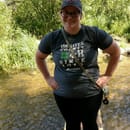Did you know that Merle Price Commons has a solar panel array on the roof? Or that all the cleaning supplies used on-campus are Green Seal and EcoLogo certified, and we use reusable microfiber cleaning towels? Did you also know that UW-Stout has a campus garden and students, faculty, and staff can receive fresh produce for being a part of our CSA program? These are just a few ways that UW-Stout has become more sustainable.
UW-Stout is a member of the American College and University President’s Climate Commitment (ACUPCC), which has hundreds of participating colleges and universities from across the U.S. UW-Stout joined ACUPCC in September of 2007, and since then has been focusing on five key areas of sustainability: buildings and energy, food and the campus garden, sustainability in the curriculum, transportation, and waste reduction.
Buildings and Energy:
Along with the solar panel array on top of Price Commons, UW-Stout has solar powered outdoor lighting, LED indoor lighting, room occupancy and daylight sensors, touchless water faucets, sensor hydration stations, and energy efficient hand dryers. We also use repurposed materials during construction, and we recycle our demolition/construction waste.
LED lighting uses LED lightbulbs that don’t require as much energy to use. The room occupancy sensors detect movement in a room, so if somebody enters the room, the lights turn on. They help us save energy by keeping the lights off when the room is not being used. The same happens with the daylight sensors. The lights stay off when it is light outside, but when it gets dark or cloudy, the lights come on. Touchless water faucets and sensor hydration stations are great at helping us save water. The touchless water faucets detect movement to turn on, and being touchless is more hygienic than the traditional water faucets. The sensor hydration stations also detect movement to turn on, and they keep track of how many plastic water bottles are saved. The water bottle I refill each day is the equivalent of two plastic water bottles!
Right now, UW-Stout has some construction work going on, mainly North Hall and the Clock Tower. When building and fixing buildings, we try to limit how much new material we use by reusing old items. When the Memorial Student Center was renovated, we recycled wood from bowling lanes. During the same renovation, 81% of the construction waste was recycled. That’s a lot of waste that stayed out of our landfills!
Food and the Campus Garden:
The UW-Sprout Campus Garden is a 1/5-acre market garden located on North Campus that provides fresh produce for students, staff, faculty, and the community. The garden is part of a Community Supported Agriculture (CSA) program, where people can buy a share and receive fresh produce from the garden weekly. The program runs from June to September and has a variety of share plans that can be purchased. The garden also donates extra produce to the local community food shelf.
Our dining services purchases food from across Minnesota and Wisconsin, so everything is fresh and comes from local farmers. They also have a reusable container program, called Green-To-Go, where students make a one-time purchase of the container, get their food, wash the container, and bring it back in exchange for another one. This is an awesome program for students who are always on-the-go and don’t always have time to eat in the dining hall.
Sustainability in the Curriculum:
UW-Stout maintains a Course Assessment that looks at sustainability in our courses. Currently, we offer several undergraduate degrees in Sustainability, and one Sustainability minor. We also have 57 undergrad and 16 graduate sustainability courses, and 160 undergrad/52 graduate courses that include sustainability.
Transportation:
UW-Stout offers many ways for students to get around campus and Menomonie. We have a StoutBikes Bike Share Program, where students can rent bikes and equipment for a day, the weekend, or the whole semester. We also have a Rideshare program where students can carpool to and from Menomonie. The Community Bus route stops at North Campus, the Clock Tower, and the Library, and is free to UW-Stout students and staff. The Stout Route runs during the week from 7:17 AM to 9:09 PM, and only makes stops at North Campus, the Clock Tower, and the Library.
Waste Reduction:
Did you know that all our waste bins on-campus are made from recycled milk cartons? Each of our waste collection centers on campus has three components: No Sort Recycling, Compost, and Trash. The No Sort Recycling Bins take paper, plastics marked #1-7, glass bottles/jars, and aluminum, tin, and steel cans. The Compost Bin takes food waste, compostable to-go containers, to-go utensils, and napkins.
UW-Stout does many cool things to help our planet, but we still need our students and staff to do their part. Our Sustainability homepage (https://www.uwstout.edu/life-stout/sustainability) is a great resource, and it provides more information on our programs, like our Campus Garden and the Bike Share Program. Now that you know what we do, it is up to you to help us help our planet!


